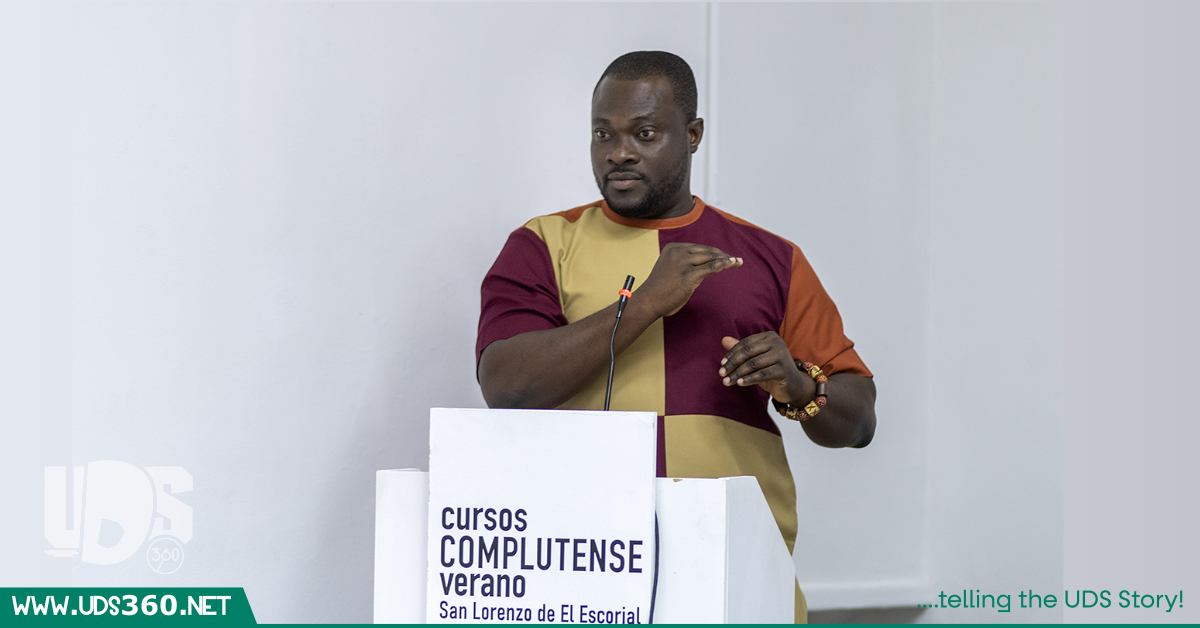- The Director of International Relations and Advancement of UDS Prof. Courage K. S. Saba on the 22th July 2022 attended the inaugural conference of the course “One Health Response and resistance to antibiotics: New approaches, new PRAN in Spain”.
- He is also an alumnus of the University for Development Studies (UDS)
- Below is as written and published on tribuna.ucm.es.
Read

At the moment, in our country, more people die from bacterial resistance to antibiotics than from traffic accidents . The global data is not very encouraging either, because it is estimated that by 2050, or perhaps by 2040 (due to the acceleration of COVID-19) we will be around ten million deaths a year due to said resistance , which will mean the greatest health problem facing humanity. Despite this, the experts see some reasons for hope , such as the fact that it is being prescribed better and better , that educational campaigns among the youngest are increasing and, above all, because the One Health perspective, which brings together human, animal and ecosystem health . This has been stated by Bruno González Zorn , in the inaugural conference of the course “One Health Response and resistance to antibiotics: New approaches, new PRAN in Spain”.
Bruno González Zorn , co-director of the course and adviser to the World Health Organization (WHO) on antibiotic resistance from a One Health perspective, has reported that since 2022, the international effort has been reinforced by going from a tripartite alliance to one with four supports . If until now the Food and Agriculture Organization of the United Nations (FAO), the World Health Organization (WHO) and the World Organization for Animal Health (OIE) were part of it , the United Nations Program has just joined Environment Agency (UNEP) .

According to the professor of the Department of Animal Health of the Veterinary School of the Complutense, this union will allow the concept to be extended beyond the health sciences , including anthropologists, economists, educators… “In general, all of science”. A concept shared by the rector of the UCM, Joaquín Goyache, in what he calls One Health 2.0 , and which should include ethical philosophers, lawyers and the whole of society, since this is a long-term problem, motivated because “ bacteria are stubborn and have been killing for centuries and we must try to go to the root of the problem”, to bacterial genetics itself and, above all, to the use of antibiotics.
González Zorn explains that bacteria are the most successful forms of life on our planet since life emerged about 4,000 million years ago, and that they will continue to be here when our species has become extinct. This is so because their genetics allow them to adapt in an “almost infinite” way and they also pass their genes crosswise from one bacteria to another .
The microbiologist recalled that in the history of the Earth the human population has not grown much until the greatest invention of all time emerged, which is none other than antibiotics . With them, “the balance between humans and the Earth was broken, and now there may be too many of us.” The problem is that bacteria continue to evolve and become resistant to the antibiotics we use, and also the pharmaceutical industry, especially large companies, have stopped developing new antibiotics, to focus on other major dilemmas such as drugs to reduce mortality of HIV.
At this precise moment, on the entire planet, only 45 traditional and 32 non-traditional antibiotics are being developed , trying to deal with a very complex problem since antibiotic resistance “works by classical Darwinian natural selection, that is, with mutations random selection of resistant bacteria. Faced with this , the consumption of antibiotics can be reduced , both in humans and in people and in the environment, although it is also possible to bet on R&D , as the MSD company has been doing for 130 years, of which it has been more than 50 implanted in Spain, according to its executive director of Policy , Cristina Nadal .
As a curious fact, González Zorn assures that one of the main sources of the creation of bacterial resistance is wastewater from hospitals in developing countries , which passes from there to other living beings, indiscriminately. Adds Rafael Cantón , director of the Department of Microbiology at the Ramón y Cajal Hospital , and co-director of the course, that the two and a half years of the COVID-19 pandemic have aggravated the situation due to the massive use of antibiotics that has taken place worldwide.

Courage Kosi Setsoafia Saba , González Zorn’s former doctoral student, reports that in Ghana , his native country, there is no limit to the purchase of antibiotics , and that means that bacterial resistance is even greater than in the countries where measures are being put in place . The African researcher is committed to a vision centered on the person, which he calls One Person , and which he himself used to recommend a specific antibiotic to a nurse from his country who was seriously ill due to bacterial resistance.
In Spain the situation is different, and this is reported by González Zorn, who assures that since the National Plan against Antibiotic Resistance (PRAN) began in 2014, a total of 80 measures have been implemented throughout the field that have resulted in a notable reduction in the consumption of antibiotics , both in human and veterinary medicine.
The director of the course trusts that the measures will increase and be implemented little by little throughout the planet, to face this great silent threat . For the moment and to receive the most up-to-date information, invite anyone who wishes to participate, both in the Summer Courses and in the webinar that the UNA Europa union of universities will hold on the subject on October 5.





Related posts



